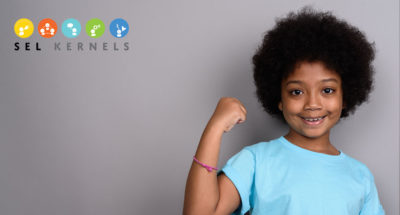
Cool Kid: An SEL Kernels Practice for Sixth Grade
Students learn to give compliments and effective praise in a routine for celebrating each student in the classroom.

Students learn to give compliments and effective praise in a routine for celebrating each student in the classroom.
Students will:
Note: Click here to download and print a card version of this practice that can be added to the other SEL Kernels practices to make an easy-to-use hand-held collection. See the Brain Games pack for additional activities.
Has to be random and all students must be Cool Kid the same number of times. Should not be contingent on behavior, grades, or anything else. Some kids don’t receive much positive affirmation, and this is about affirming the value or worth of every student.
This practice is part of the SEL Kernels project developed by the EASEL Lab at Harvard University.
Students who score higher on measures of social competency (e.g., “is helpful to others,” “shares materials,” “resolves peer problems on own,” etc.) are more likely to graduate from college, secure a full-time job, and have better mental health. They are also less likely to have a criminal record, receive public assistance, and/or have substance abuse problems.
Interpersonal skills, or the ability to interact with others effectively, are key to student learning and success. Social and interpersonal skills support children and youth to accurately interpret other people’s behavior, effectively navigate social situations, and interact positively with peers and adults.
Students must be able to use these social/interpersonal processes effectively in order to work collaboratively, solve social problems, and coexist peacefully with others. These skills help them build strong relationships with others, which are essential to success and happiness in life.
For example, students who develop warm, positive relationships with their teachers are more excited about learning, more positive about coming to school, more self confident, and achieve more in the classroom. On the contrary, any student with severely limited peer involvement is at considerable risk for significant adverse developmental consequences.

Are you ready to build a kinder, happier school where everyone belongs? Join Greater Good Educators! Explore the science of well-being in a supportive community of educators from around the world. Registration is now open for the 2025-2026 school year!
Comments